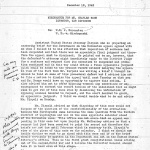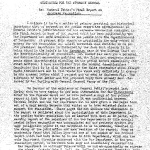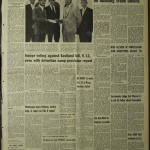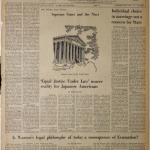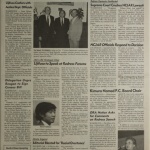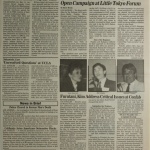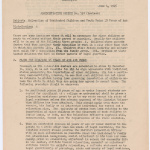Oyama v. California
The 1948 U.S Supreme Court case Oyama v. California (332. U.S. 633) struck down certain provisions of California's notorious Alien Land Act as applied against U.S. citizens of Japanese ancestry. While the majority opinion did not reach the question of whether the Act was constitutional as applied to aliens, in practice it halted all state enforcement of it. Together with Takahashi v. California Fish and Game Commission , decided soon after, Oyama reversed decades of legal discrimination against Asians as "aliens ineligible to citizenship."
Land Law Background
The Oyama case grew out of California's "Alien Land Act," enacted in 1913, further amended in 1920, and originally upheld by the U.S. Supreme Court three years later. According to this law (and the copycat laws subsequently enacted in other Western states) Japanese and other Asian immigrants who were "ineligible for citizenship" under federal law were forbidden to own agricultural property. As a result, Issei were forced to lease land, join with white partners in corporations to hold the land, or place title in the name of their Nisei children, who were citizens. During the 1920s, California courts upheld the right of Issei to serve as guardians of property for minors. In part as a result, the Act was seldom enforced against violators—barely a dozen suits were filed in its first 30 years.
The wartime confinement of West Coast Japanese Americans altered the situation. California legislators enacted a series of restrictive laws with the twin goals of expressing hostility against excluded Japanese Americans and preventing excluded Japanese Americans from returning to the state after the war. One measure, adopted in 1944 and 1945, provided funding for "escheat" suits to take property away from Japanese aliens. The state took the position that even if Issei guardianship of land was legal, all transfers of land from Issei to their children could be presumed to have been made in defiance of the Alien Land Act. Within a few years, some 59 cases had been brought. [1] Even though by 1946 there were barely 10,000 "aliens ineligible to citizenship" farming in California, most of whom were elderly, these escheat proceedings were enormously damaging to all Japanese Americans. Title companies refused to insure Japanese American farmland, except at exorbitant rates, and numerous families lost their land or were forced to pay large sums to the state government (usually half the assessed value of the land) in order to "quiet" title.
Mounting a Test Case
In early 1945, Fred and Kajiro Oyama brought a legal challenge to the Alien Land Act. Fred was a Nisei from San Clemente who had been given two small parcels of land bought by Kajiro, his Issei father, during the 1930s. In 1944, after the Oyamas had been forced by Executive Order 9066 to leave the West Coast and move to Utah, State Attorney General Robert Kenny commenced an escheat proceeding, claiming that the family property had been transferred to Fred in order to evade the Alien Land Act. Since Kajiro, a methodical man, had been officially appointed his son's legal guardian during the 1930s and had regularly completed the associated paperwork, the Oyamas had a strong case. With the aid of Keisaburo Koda and Shichinosuke Asano, they organized the Society for the Promotion of Japanese-American Civil Rights to fund a test case. [2] The Oyamas' case was soon taken up by Japanese American Citizens League (JACL) Counsel A.L. Wirin , a white Jewish lawyer who was also head of the Southern California branch of the American Civil Liberties Union , and by Hugh Macbeth , an African American attorney from Los Angeles who had worked with the JACL on the Regan v. King case and signed its amicus briefs in the Hirabayashi and Korematsu cases. The People v. Oyama case, along with a companion case, People v. Hirose , was argued in San Diego Superior Court in February 1945. The trial judge refused to examine the Act's constitutionality, and ruled against the Oyamas. With aid of James C. Purcell ( Mitsuye Endo's former attorney), who succeeded Macbeth, Wirin then appealed to the California Supreme Court, which in 1946 upheld the Alien Land Act, in the process overturning its previous decisions authorizing Issei to serve as legal guardians for minors.
In mid-1947, Wirin, with the aid of both the JACL and the ACLU, decided to appeal his case, now called Oyama v. California , to the United States Supreme Court. In his petition, he and his colleagues shifted their strategy. Rather than emphasizing the denial of rights to Asian aliens, as they had in California, Wirin and his colleagues argued that the Alien Land Act violated the 14th Amendment rights of citizens of Japanese ancestry. The Act presumed that any land that a citizen of Japanese ancestry received from a parent ineligible to citizenship was made in order to evade the law. It thus placed an unfair burden on these citizens, based on their race, to prove that the gift was made in good faith. Wirin concluded that there was a strong presumption against any such "race" legislation under the 14th Amendment, and that courts should rigorously scrutinize the impact of such laws, rather than assuming they were constitutional. Dean Acheson, a distinguished Washington lawyer and former assistant secretary of state (and who would become President Harry Truman's secretary of state soon after) agreed to serve without fee as chief counsel.
Supreme Court Ruling and Legacy
In January 1948, the U.S. Supreme Court ruled 6-3 in Oyama v. California that the Oyamas could keep their land. In his majority opinion, Chief Justice Fred Vinson proclaimed that under the Equal Protection clause of the 14th Amendment, only the most exceptional circumstances could constitutionally justify any laws that made "racial classifications" among citizens. Although the majority opinion in Oyama decided the question solely on the basis of the rights of citizens, four of the justices joined in concurring opinions affirming that race-based discrimination against aliens was equally unconstitutional. The state of California clearly saw the handwriting on the wall, and immediately halted all pending escheat actions.
The Oyama victory saved many Japanese Americans from impoverishment, and signaled the reversal of California's historic legal discrimination against Japanese aliens. The Alien Land Act would later be definitively struck down by the California courts in Fujii v. California (1952) and Masaoka v. California (1952), even as the 1952 McCarran-Walter Immigration Act put an end to the category of "immigrant ineligible to citizenship." In larger terms, the Oyama decision established the Supreme Court's doctrine of "strict scrutiny," according to which judges had the duty to presume that any laws that made racial classifications were unconstitutional unless they were narrowly tailored to meet compelling state interests, and to examine their provisions closely to determine whether they did so. This new policy (which originated, ironically, in the Court's notorious 1944 Korematsu decision) would soon be developed in cases involving African Americans, and would serve as precedent for the Court's historic 1954 Brown v. Board of Education school desegregation decision.
For More Information
Brilliant, Mark. The Color of America Has Changed: How Racial Diversity Shaped Civil Rights Reform in California, 1941-1978 . New York: Oxford University Press, 2012.
Chuman, Frank F. The Bamboo People: The Law and Japanese-Americans . Del Mar, Calif.: Publisher's Inc., 1976.
Oyama et al. v. California 332 U.S. 633 (1948) on Google Scholar, http://scholar.google.com/scholar_case?case=15171183144489494599&hl=en&as_sdt=2&as_vis=1&oi=scholarr .
Robinson, Greg. After Camp: Portraits in Midcentury Japanese American Life and Politics . Berkeley: University of California Press, 2012.
Villazor, Rose Cuison. "Rediscovering Oyama v. California: At the Intersection of Property, Race, and Citizenship." Washington University Law Review 87 (2010): 979–1042. https://openscholarship.wustl.edu/cgi/viewcontent.cgi?article=1101&context=law_lawreview
Last updated Feb. 6, 2024, 3:47 a.m..


